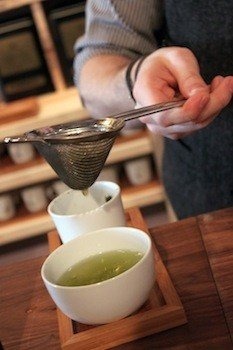Restaurants Have A Tea Party
Order an iced tea at Eastern Standard in Boston and you'll get a glass brewed from equal amounts of green and black tea, spiked with a little bit of mint.
The restaurant, which sells the tea for $3, began offering that particular variety three years ago, after general manager Andrew Holden was introduced to the blend by a supplier and thought it would be a crowd-pleaser.
"It seemed like a risk to break away from strong black iced tea, [but it] had incredible balance," he said. "The beauty of this blend is that it's not so off the beaten path or delicate or floral. People across the board are into it."
Holden is just one of many restaurateurs nationwide who are tapping into signature blends and new flavors to capitalize on the growing tea market. Aided by a healthful reputation and the decline in carbonated soft-drink sales, iced tea orders rose 4 percent for the year ended March 2011, according to Port Washington, N.Y.-based research firm The NPD Group. During the same period, hot tea orders increased 2 percent.
As customers shy away from sodas, operators are upgrading tea offerings to appeal to their desire for something new — and to keep them from trading down to tap water.
"There's certainly been a decline in our clientele drinking sodas and ordering soft drinks," Holden said. "They're looking for another beverage, and iced tea certainly falls in that category."
Randy Murphy, president and chief executive of the Mama Fu's Asian House chain, based in Austin, Texas, said that over the past three years tea has been outselling soda at his chain's 13 units, half of which are in central Texas.
The chain's top seller is a jasmine-infused green iced tea. Sweet tea is popular, as well. Murphy said the jasmine green tea tastes great, but he added that he thinks his customers' awareness about its reputed health benefits adds to the tea's appeal.
"It's a great complement to our food [and] one of our best-margin items on the menu," he added.
According to an August report from Chicago-based Technomic, 73 percent of consumers say they are interested in either hot or iced green tea, driven in part by its reputation for being rich in antioxidants. Lemon and honey flavors appealed to 61 percent and 60 percent, respectively, in the same study.
But regardless of flavor, research shows tea has to be high quality to make a real impact on sales. In a study of the Canadian tea market, NPD found that customers there are more likely to order tea if they're confident it's going to taste good.
"At casual-dining restaurants, 31 percent of tea drinkers surveyed told us that they order tap water rather than get a poor cup of tea," NPD account manager Vince Sgabellone said. The study found that poor quality, poor selection, and poor execution all were leading reasons tea drinkers didn't order the beverage in restaurants. And investing in better tea offerings can pay off, experts say.
"The cost to brew a cup of iced tea is pennies per serving," said George Jage, president of World Tea Expo. Spending 5 cents per cup instead of 3 cents can generally allow for an upsell of between 50 cents and $1, he added.
Brewing tea well can be a challenge, however, as the quality can be impacted by even subtle differences in the temperature of the water.
"It turns out that when they tell you to brew tea a certain way, it does make a difference," said Sean Henry, owner of Houndstooth Coffee in Austin. He said a growing number of his customers are interested in tea — black tea in the morning, and others, such as goji berry white tea, mint tea, and green tea in the afternoon and evening.
"We try to develop people's tastes on different types and styles of tea, and brew them as well as we can," he said. Houndstooth uses loose-leaf tea brewed in 18-ounce pots. For teas requiring cooler water, Henry has calculated how much ice to add to just-below-boiling water to get the desired temperature.
At Doc Chey's Noodle House, an Asian concept with three locations in Atlanta and one in Asheville, N.C., tea makes up the bulk of beverage sales. Although the chain's Southern locations help make sweet tea a popular item, the best sellers are a spiced masala chai, a jasmine green tea, and an herbal blend called Fire Ginseng, which combines Korean red ginseng and other botanicals.
Most of the tea at Doc Chey's is hot, sold in 16-ounce pots for $2.50 and usually split between two people. Iced tea is $1.75 and is available either as sweet tea or unsweetened jasmine tea. Owner Rich Chey said the two iced teas are equally popular, adding that, with an average per-person check of $10 to $12, the tea is a good upsell. "It's also a nice point of distinction for us," he said.
Stella Maemoto, manager of the Tea Lounge at the Mandarin Oriental hotel in Las Vegas, said having a point of distinction is key to successful tea sales. She noted that the lounge's most popular tea is the Mandarin orange blend, made with black tea, Mandarin orange blossoms, and a hint of vanilla. "A lot of our customers go for that because they know they can only get it at our property," she said.
— Bret Thorn, NRN.com
